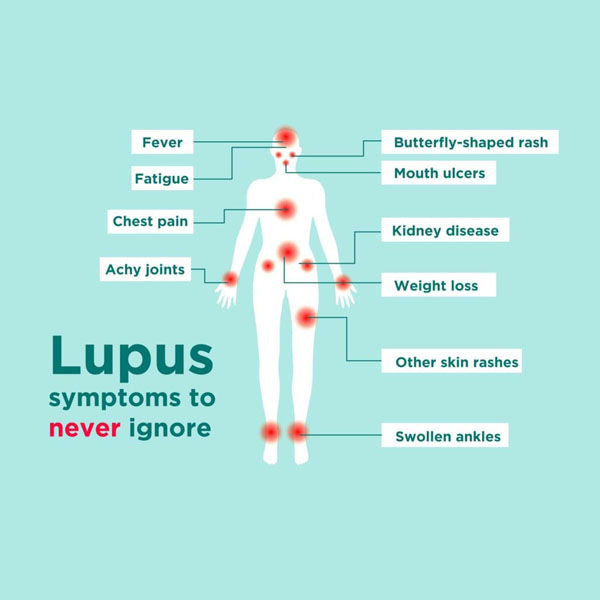Lupus is a Chronic Autoimmune Disease that occurs when your body’s immune system attacks your own tissues and organs. Chronic means that is long-term and there is no cure. Lupus can be either localized or systemic. Systemic means that it relates to an entire part of the body and not just one spot. The inflammation that Lupus causes can effect several body systems including: heart and lungs, blood cells, kidney, skin and joints.
Inflammation is caused when your immune system fights an infection or injury in our body. Lupus tricks your body into thinking that healthy tissues are injured or infected. This causes symptoms like swelling and pain because of cellular break down.
Lupus is hard to diagnose because it mimics several other autoimmune diseases, but it is important to see your doctor and be your own advocate. If you are experiencing an unexplained rash, ongoing fever or continuous aching and / or fatigue please make an appointment to see your medical professional as soon as possible.
There is no one test to rely on for a Lupus diagnosis but your doctor will ask a lot of questions and refer you for blood tests, urine tests, imaging tests and possibly a tissue biopsy to look for specific antibodies, blood count, proteins, inflammation and damage in specific areas that are common in people with Lupus.
The Most Common Symptoms of Lupus
- Fatigue
- Fever
- Joint pain, stiffness and swelling
- Butterfly-shaped rash on the face that covers the cheeks and nose or rashes on other parts of the body
- Skin lesions that appear to get worse in the sun
- Fingers and toes that turn white or blue when very cold or during great stress (Raynaud’s phenomenon)
- Shortness of breath
- Chest pain
- Dry Eyes
- Headaches, confusion and memory loss
Symptoms of Lupus are different for different people. In some people symptoms come on slowly and in others, very suddenly. Many people have mild symptoms regularly and then they have flares where the symptoms are worse. Some people have their symptoms disappear for a time and then they return. Some people always have symptoms. The symptoms that people experience often reflect the area of the body that is being attacked.
There is still much to learn about Lupus, but it appears that genetics and environment can be the cause of Lupus. Hormones, sunlight, infections and certain medications can trigger Lupus or make flares worse. Treatment includes focusing on reducing inflammation and easing symptoms.
It is common for people with Lupus to experience photosensitivity. This means that they are particularly sensitive to the UV rays from the sun and even types of artificial light. People who have photosensitivity should be careful to wear sun-protective clothing and sunscreen any time they are spending time outside to avoid heightened experiences with rashes, fatigue, joint pain or internal swelling.
Who is Most Likely to Have Lupus?
- Women have Lupus much more commonly than men. 9 out of 10 people with Lupus are women.
- Lupus is most often diagnosed between the ages of 15 to 45; although this disease affects people of all ages.
- Lupus is most common in African-Americans, Hispanics and Asian-Americans, Native Americans and Pacific Islanders.
- People who have family members with Lupus or other autoimmune diseases.
People who live with Lupus must be careful when it comes to other issues that can arise due to this autoimmune disease. People who have Lupus are more sensitive to infection because Lupus and the treatments for Lupus weaken the immune system. There is a very small, but still greater risk of people with Lupus to get cancer. In people with Lupus that attacks the blood and / or blood vessels, there is a greater chance at bone tissue death because of the decreased blood supply to the bone the causes tiny breaks in bones until they collapse. Women who have Lupus also have a greater risk of miscarriage and preeclampsia during pregnancy so it is advised to not become pregnant until the disease has been under control for at least 6 months.
The most common areas that Lupus may affect in a person are:
- Kidneys – Kidney failure is the leading cause of death in people with Lupus
- Brain and central nervous system – Lupus that affects this part of the body causes headaches, dizziness, behavior, memory and vision issues. Many times people have trouble communicating their thoughts.
- Blood and blood vessels – Anemia and greater risk of bleeding or blood clotting and inflammation of blood vessels (vasculitis) are common with Lupus that affects this system.
- Lungs – Pleurisy (inflammation of the chest cavity), pneumonia and bleeding into the lungs are issues that people with Lupus may experience.
- Heart – Inflammation of the heart muscle, arteries or heart membrane (pericarditis), heart attack and cardiovascular disease are possible responses in a person where Lupus effects their heart.
There are 4 Types of Lupus
- Systemic Lupus Erythematosus
- Cutaneous Lupus Erythematosus
- Drug-induced Lupus Erythematosus
- Neonatal Lupus
The name “Lupus” comes from the Latin word for wolf, referring to the facial lesions that look similar to a wolf’s bite. The word Erythematosus comes from the Greek word, erythros, meaning red, which describes the color of lesions.
Systemic Lupus Erythematosus is the most common form of Lupus. It often attacks the kidneys, nervous system, blood vessels in the brain or arteries in the heart.
Cutaneous Lupus Erythematosus is a form of Lupus that is limited to the skin. It is showcased in rashes or lesions on the skin that are raised, scaly, red and not itchy. These rashes tend to be round in shape and appear on the face, neck, scalp, in the mouth, nose, or vagina. Hair loss and changes in the color of the skin are also symptoms of this type of Lupus. 10% of people with this form of Lupus will also develop Systemic Lupus.
Drug-induced Lupus Erythematosus is caused by taking certain drugs like: Hydralazine, Procainamide, Isoniazid. This form of Lupus is most common in men, mainly because men are more likely to take these medications. Most of the time the Lupus-like symptoms will go away within 6 months of stopping this medication.
Neonatal Lupus is not really Lupus, but it happens when the mother has Lupus and her antibodies respond to the baby. Babies born with Neonatal Lupus may have skin rashes, liver problems or low blood cell counts, but these symptoms usually disappear after several months and the baby is totally healthy afterwards. In serious cases doctors can identify and treat the baby at or before birth.
Lupus and Diet
There is not one specific diet for people with Lupus. The focus is to have a balanced diet. All people should eat a diet that is rich in:
- Omega-3 fatty acids found in fish like salmon, tuna or mackerel
- Calcium rich foods like low fat dairy, leafy green vegetables and nuts
- Whole grains like oatmeal and grainy breads
- Colorful blends of fruits and vegetables
- Vitamin D supplements are often suggested because of lack of sunlight one gets when they have photosensitivity
Foods that people with Lupus should avoid, mainly because they react badly with known medications that people with Lupus take are:
- Alcohol
- Alfalfa – it is high in an amino acid called L-canavanine that can increase inflammation and lead to flares
- Foods high in salt and cholesterol
Lupus is not contagious so you don’t have to worry about giving it to someone or getting it from someone with Lupus. Thankfully due to improvements in innovations and testing, people who receive proper medical care and make lifestyle changes that decrease inflammation and answer their bodies need for sleep, exercise and good nutrition and water intake, can look forward to a nice long life as long as they don’t experience too many complications from Lupus.
I hope this article answered questions you had and was easy to understand. If you would like us to write about a particular topic that you can’t find on this site, please send us an email on our Dear Jamie page and someone from Our Team will be glad to research and write about your topic.
Resources and Start Learning More:
- Defining Comorbidity: Implications for Understanding Health and Health Services by Jose M. Valderas, MD, PhD, MPH, Barbara Starfield, MD, MPH, Bonnie Sibbalkd, MSc, PhD, Chris Salisbury, MB, ChB, MSc, FRCGP, and Martin Roland, CBE, DM, FRCGP, FRCP, FMedSci for US National Library of Medicine National Institutes of Health
- Everything You Want to Know About IBS by Jaime Herndon and Tricia Kinman, medically reviewed by Daniel Murrell, MD for HealthLine
- Irritable bowel syndrome by Mayo Clinic Staff
- Irritable bowel syndrome: epidemiology, diagnosis and treatment: an update for health-care practitioners by O. Grundmann and SL Yoon for US National Library of Medicine National Institutes of Health
- What Exactly Are Syndromes? An Interview with Dr. Kirtly Jones for The University of Utah
Related Articles
- Learning About Miscarriage Signs, Symptoms & Treatment
- Learning About IBS
- Rare Disease: How to Live Well Anyway
- Be Your Own Advocate
- Living with Central Sensitization Syndrome More Commonly Referred to as Fibromyalgia
I hope this article helps Fuel Your Wellness. Please leave your comments below.
 Summer D Clemenson co-owns Clemenson Enterprises and Wellness Works NW with her wife, Karen G Clemenson. Their personal motto is Creativity, Honesty & Positivity are a must! This mantra helps them stay community and wellness minded in all they do. Summer is an Independent Wellness Advocate at dōTERRA. Summer also writes poetry and inspirational blogs @ ClemensonEnterprises.com. Her crochet art can be viewed and purchased @ KnottyWares.com & she loves special orders!
Summer D Clemenson co-owns Clemenson Enterprises and Wellness Works NW with her wife, Karen G Clemenson. Their personal motto is Creativity, Honesty & Positivity are a must! This mantra helps them stay community and wellness minded in all they do. Summer is an Independent Wellness Advocate at dōTERRA. Summer also writes poetry and inspirational blogs @ ClemensonEnterprises.com. Her crochet art can be viewed and purchased @ KnottyWares.com & she loves special orders!













